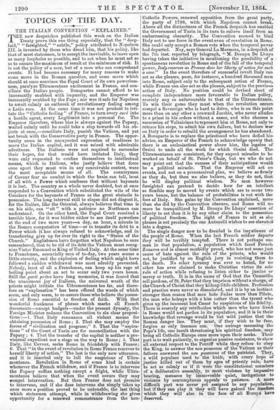TOPICS OF THE DAY.
THE ITALIAN CONVENTION "EXPLAINED." THE new despatches published this week on the Italian Treaty prove this one thing especially, that the " deep- laid," " farsighted," " subtle," policy attributed to Napoleon Catholic Powers, renewed opposition from the great party,. the party of 1798, with which Napoleon cannot break. Above all the distinctness of the French despatch has enabled the Government of Turin in its turn to relieve itself from an embarrassing obscurity. The Convention seemed to bind Italy not to use force in the event even of revolution in Rome. She could only accept a Roman vote when the temporal power had departed. Nay, says General La Marmora, in a despatch of the 7th inst. reported by telegraph, " M. Drouyn De Lhuys having taken the initiative in mentioning the possibility of a • spontaneous revolution in Rome and of the fall of the temporal power, Italy reserves as France does her liberty of action for suck a case." In the event therefore of successful revolt Italy can act as she pleases, pour, for instance, a hundred thousand men into Rome, subject only to the subsequent action of France,. while France can also act as she pleases, subject to the previous action of Italy. No position could be devised short of complete independence more favourable to Italian policy, scarcely any so unfavourable to that of the Ultramontanes.. To win their game they must when the revolution occurs compel a Sovereign who is hard to drive, who is on this point more than on any other a crowned Jacobin, who never alludes to a priest in his orders without a sneer, and who chooses a succession of Voltairians to represent him at Rome, not only tsr retrace his steps, to admit his own failure, but to declare war on Italy in order to rebuild the arrangement he has abandoned. A Bonaparte is to replace the priesthood who have defied his- advice, an Emperor of the French to acknowledge openly that there is an ecclesiastical power above him, the legatee at' Orsini to undo all the work for which Orsini died. The• Ultramontanes are consistent, for they expect miracles to be worked on behalf of St. Peter's Chair, but we who do not may point out that the success of their anticipations would, be a political miracle. That the Emperor will act on events, and not on a preconceived plan, we believe as firmly as they do, but then we also believe, as they do not, that he will display political wisdom. No man however• farsighted can pretend to decide how far an intellect so flexible may be moved by events which are to occur two, years hence, but the balance of probabilities is not with the foes of Italy. She gains by the Convention explained, more than she did by the Convention obscure, and Rome will no• more be tranquillized by M. Drouyn De Lhuys' assertion of liberty to act than it is by any other claim to the possession of political freedom. The right of France to act as she pleases is not precisely the one Antonelli wishes to see elevate into a dogma.
The single danger now to be dreaded is the imFatience of the people of Rome. When the last French soldier departs. they will be terribly tempted. There is not perhaps one man in that population, a population which faced French Zouaves and is almost morbidly proud, who has not some just cause of hate against the rule of the priests, who would not be justified by an English jury in resisting them to the death. No other tyranny was ever so hated, for no has ever claimed to make Christian virtue its sole rule of action while refusing to listen either to justice or mercy or truth. It is in the name of God that the Camarilla sell pardons, of St. Peter that they imprison without a charge, of the Church of Christ that they kidnap little children. Profession and practice were never so dissociated, and it is by an instinct stronger than reason that men hate Judas more than Pilate,. the man who betrays with a kiss rather than the tyrant who gives up the innocent lest Ctesar be suspicious of his fidelity. There is scarcely any retribution which men who have lived in Rome would not pardon in its population, and it is in their knowledge that revenge would be but wild justice that the Roman danger lies. They must, if they wish to be free-, forgive as only freemen can. One outrage menacing the Pope's life, one insult threatening his spiritual freedom, may bring all Catholic Europe once more upon their necks. Their part is to wait patiently, to organize passive resistance, to show all external respect to the Pontiff while they refuse to obey the King, to answer the non possumus of' the Vatican as their fathers answered the non possumus of the patriciat. They, a wild populace used to the knife, with every hope of justice killed out of them by ages of priestly rule, have to act as calmly as if it were the constitutional members of a deliberative assembly, to meet violence by impassive bearing, menaces by immoveable quiet, instigations to violence by contemptuous appeals to patience. A more difficult part was never yet assigned to any population, but if they can play it they will have gained the freedom which they will also in the face of all Eurore have deserved.






























 Previous page
Previous page